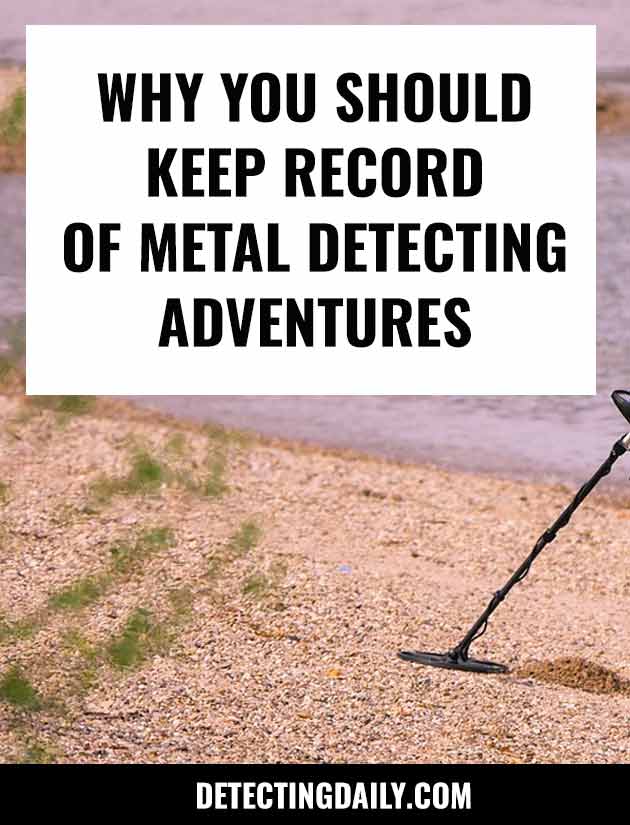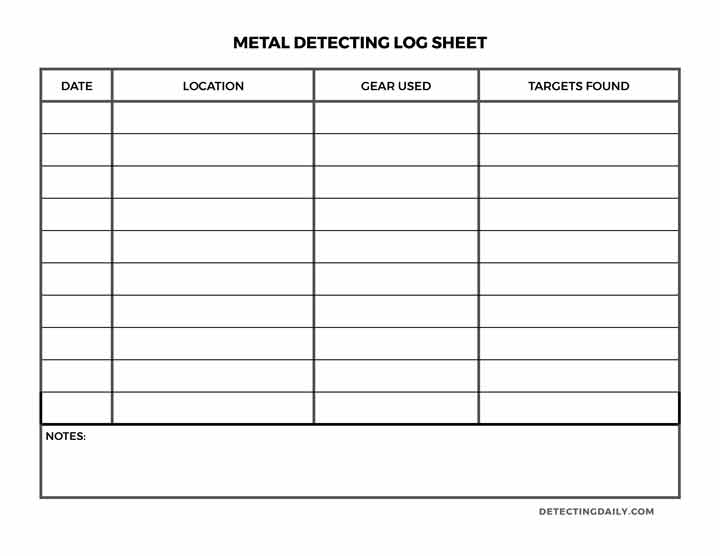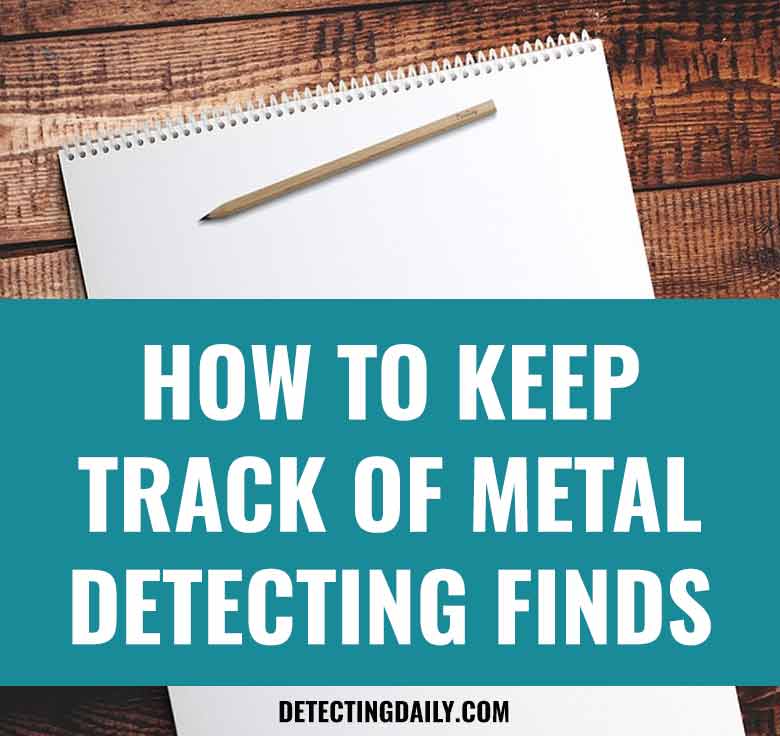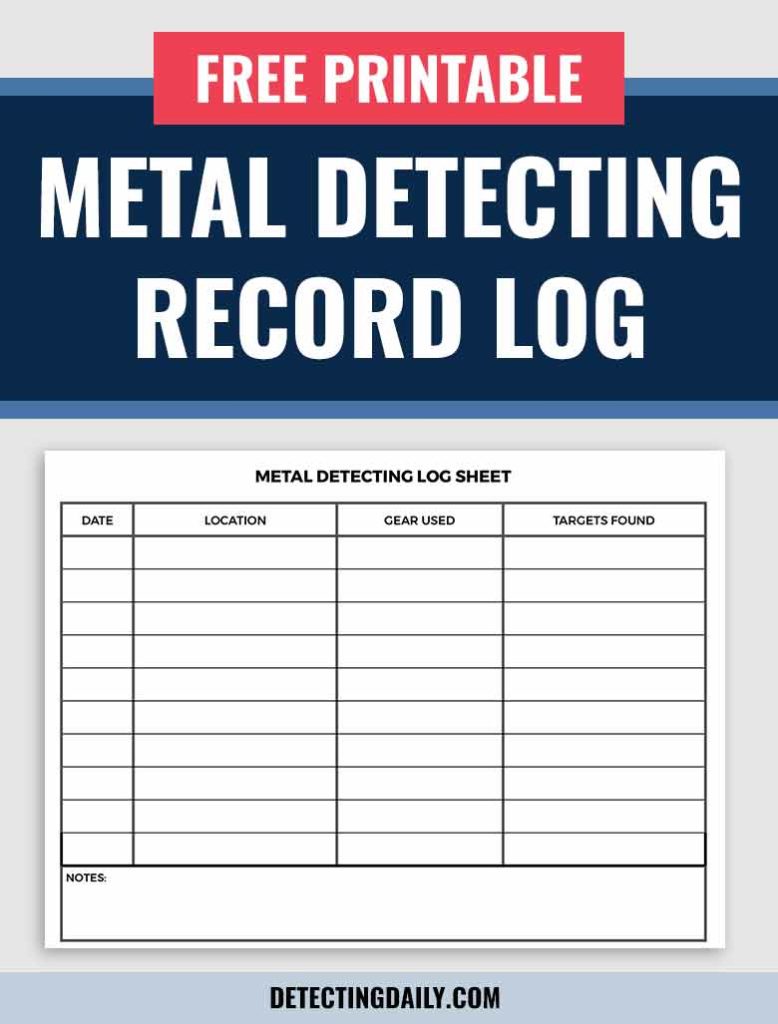We may receive a commission when you make a purchase from one of our links to sites such as eBay and others. As an Amazon Associate we earn from qualifying purchases. Thank you for support!
Want to be a better metal detectorist? Start writing down everything in a metal detecting record log to keep track of all of your adventures!
I find it super helpful to be able to remember the details like where I go, what I find, what kind of gear I use, and any other notes about targets I discover. This is especially true for locations I like to go to often!
Today I wanted to share a little bit about how I use a log for metal detecting – and of course share a free printable version of the record keeping log I use to record all of the details.
Why Keep a Record of Your Metal Detecting Adventures?

I like to keep track of every adventure I go on – even if I don’t find anything fantastic while I’m out searching. Every time I go out with the metal detector, I see it as an opportunity to practice and learn.
Using this free printable at the end of this post, it is super easy to create your very own metal detectorist logbook. Just print it out, punch holes in it and stick it a binder. You could also tape it into a simple notebook.
Here are 3 Really Good Reasons to Keep a Metal Detecting Log:
1. Remember Details Easily
It is very easy to forget certain details, especially if you visit a certain location more than once. The only way to know anything for sure is to write it down!
For example, one of my favorite places to metal detect is a place we’ve probably visited hundreds of times, starting when I was a little kid. It’s all too easy for my memory to try to piece together fragments of different trips and think they were the same one!
2. Track Dynamic Variables like Weather and Season
Most of the places we might go metal detecting have a lot of dynamic variables. The weather we all know can be sometimes a factor in whether ground is easy to dig. Sometimes events like a lot of rain or flooding can cause things to move around.
Even when I’m metal detecting in my own backyard I find that the seasons and weather can cause some very big changes over time! If you understand how metal detectors work, it’s not surprising that simple things like moisture or humidity may even affect what you might find!
Seasons also play an important factor. Tourist areas like beaches may have more activity in the summer months – but in the off season you may find it is a lot easier to scout areas that in the summer would be too crowded to metal detect at.
Keeping track of these things makes it easier to analyze the data and start noticing patterns. If you notice there are times you have better results at a certain time of year or after certain types of weather, you can make it a habit to try to metal detect more often during those times.
3. Makes it Easier to Learn More About the Things You Find
Sometimes when we dig up something, we have no idea what it could be that we find! I seem to have great luck in finding a number of unidentifiable objects while metal detecting.
If there is something I’m not able to easily identify, I can make a note on the record for how deep it was found, what metals I believe it might be made of, and other details. This makes it a lot easier when I get home to try to piece together the history of the mystery item.
If you are a relic hunter or beginner coin collector, it can be useful for tracking where different types of items are found. If I find a spot that’s great for wheat pennies or mercury dimes, I know I’m going to want to find more places like that!
While record keeping isn’t completely essential, it definitely does help me learn how to recognize patterns. Being able to identify and understand these patterns is what gives someone the benefit of experience in finding the good stuff.
How I Use a Simple Log to Record My Finds While Metal Detecting
While my system for record keeping is super simple – it’s also super flexible. You’ll notice in my printable tracker that you can download for free at the end of this post, I don’t have a lot of columns for a ton of information.
However, it does serve the most important thing: It’s so simple I have no excuse to at least fill in something.
When something is simple, it is easier to do. When something is easy to do, it is easier for it to become a habit.
I’m sure a lot of detectorists might look at this and think, what, it’s only 4 columns!

However, this was by design! I knew if I had columns for every little detail, I would inevitably forget to write things down. I also knew that sometimes while metal detecting I don’t always need certain data for my own records.
Of course, if you DO want something a little more advanced, there are also some great metal detecting logbooks available to buy from Amazon.
For me however, the simpler the metal detecting logbook, the better! Less is more!
For example, when designing my log sheet, I thought maybe it would be good to have a column specifically for GPS coordinates. Until I realized I generally don’t go off-grid all that often that I would even use GPS coordinates.
Instead of wasting space to create a column I would inevitably rarely use, I decided to simply keep a lot of extra room on the paper to write down extra notes. That way, if I did for some reason have GPS coordinates, such as out in a field of hundreds of acres – then there was space to write it down.
This would also ensure my inner perfectionist would not be stressing out about an empty column on my sheet!
Some Tips for Using This Printable Tracker

While the log is designed with enough space that you could probably fit everything on one line, you also have the flexibility to use more than one line for each target. There are tons of different ways to make this record-keeping sheet work for you!
This tracker is super flexible – and you can make note of these things if you want to, but you certainly don’t have to.
Here are some things to keep in mind to make this work for you:
1. Write Down Only What Information You Actually Need and Will Use: There is no need to keep track of everything! Like I said, it is purposely simple so it can be flexible. If you want to know details like GPS location or depth – make a note of it! If you don’t want those details – no worries on leaving them out.
2. ALWAYS write down a date! For me, the date is the most important data on this metal detecting log. Being able to know when you hunted an area will help you know the good seasons, especially if it is a public area like a park or beach that you frequent often.
3. Make Notes Even if You Don’t Find Anything: Yes, you should keep track of times when you go out and don’t find anything except aluminum pop can tabs. Again, recording the date will help you know, okay, so maybe that pavilion near the ball field is not a good location in February because people aren’t going there that time of year – I’ll try it again in late summer and early fall.
4. Write Down Details That Matter to You: We have some interesting weather here, and often times there are floods or heavy rainfalls that can stir up a lot from the creeks and rivers. If there was recent flooding or heavy rainfall in an area, I like to keep track of that and make a note of it in the locations column. Of course, if the weather is not important, then leave that out!
5. Keep Track of Gear: I notice I do sometimes see different results with different coil sizes. Knowing what coil I used can help me recognize patterns like, hmmm – if I use this coil in this area I’m finding a lot more of the good stuff! Even if you don’t yet have multiple coils or machines – it is highly possible eventually some day you might! Keeping track of this now will help set you up for a good habit in the future!
6. Make it a Habit to Write Things Down: I like to write my notes either while I’m in the car before I drive home or immediately when I get home – this way it’s a habit and details are still fresh in my memory.
7. Analyze the Data Every So Often: After several months or a particularly busy season of detecting, I like to analyze the data to look for new patterns. For example, if I notice I find my best things in a certain spot at a certain time of year after certain weather conditions, then I know to do more of that! Conversely, if I’m going on a lot of hunts and coming home empty handed or with things to throw in the recycling bin, then I know it’s probably not the greatest place and timing for searching.
Okay, now that we’ve covered these important basic tips, let’s get to the free download, shall we?
Download the Free Printable Metal Detecting Activity Tracker

If you want to give my system a try for yourself, I am including a link to download the free high-resolution print-ready PDF version of my metal detecting record-keeping log here down below – just click the big green button. There is no sign-up required – click, save and print!
Please note, you will need to be able to read PDF files to open the document. This is typically standard software on every single computer and smart phone.
If for some reason you are unable to open the file, you can always download the free Adobe Acrobat PDF Reader. Make sure you download it directly from the Adobe website to avoid any potential problems!
I hope you enjoy these tips and the free printable metal detecting log for keeping track of your adventures and making your own logbook for metal detecting. And of course, if you have any questions feel free to ask in the comments section below!